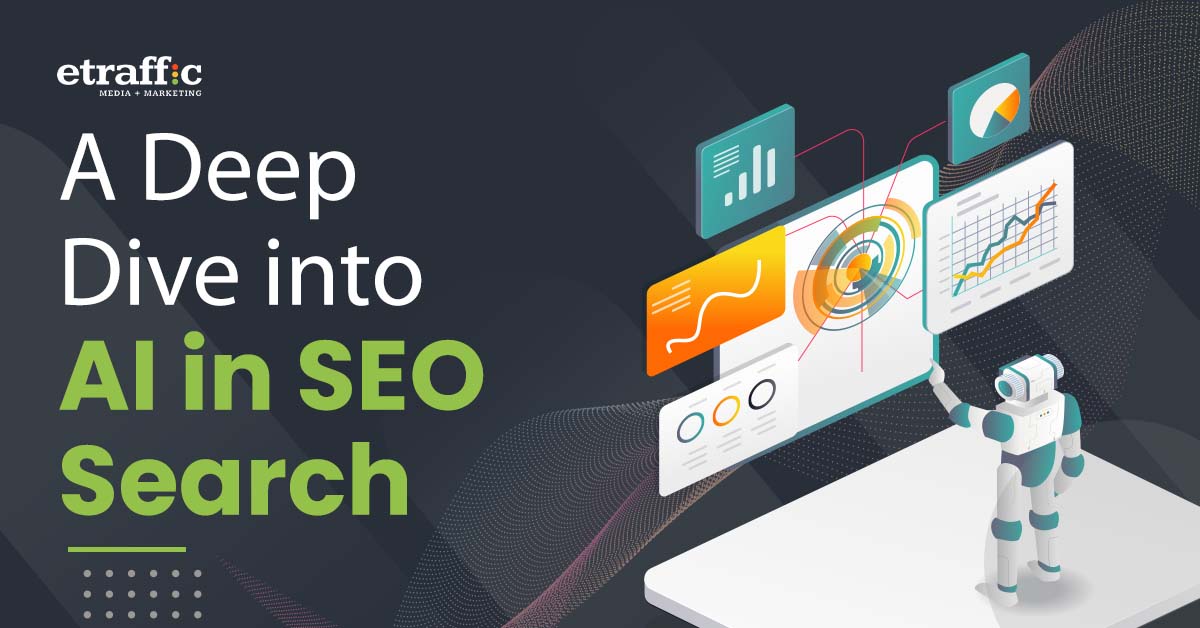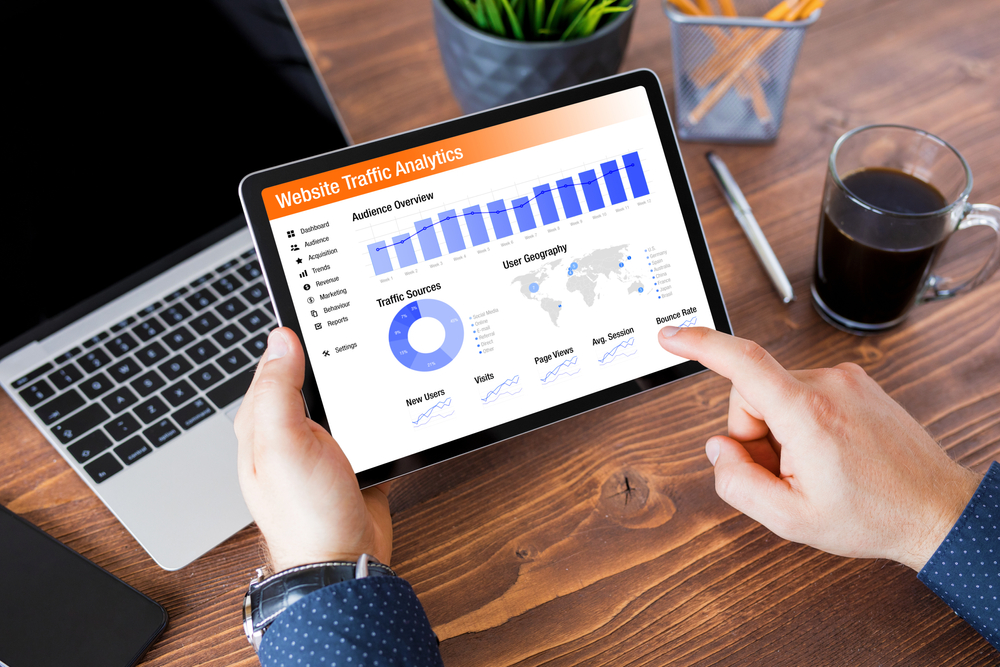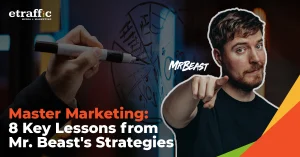![]() Posted by Cameron Francis
on
08 Jul , 2022
in
Posted by Cameron Francis
on
08 Jul , 2022
in

First of all, what is AI? AI stands for Artificial Intelligence and is a technology and branch of computer science concerned with the development of machines, systems, and software to perform tasks that need/require the deployment of human intelligence in machines. In this regard, AI is akin to simulating human intelligence in machines. The machines are designed and programmed to perform cognitive functions and exhibit traits characteristic of human beings, including problem-solving and learning.
However, unlike humans, who are limited in the capacity and speed of processing large data sets, AI can use superior computers to find patterns in the data set that humans could not find such as those in Search Engine Optimisation. AI can use the resulting patterns to make predictions and learn from the success and failures of the predictions it makes. As such, one of the defining characteristics of AI is its ability to learn, alter, and improve itself without human intervention.
And as a consequence of using high-powered and high-capacity computers, all these processes happen at scales and speeds that exceed human capacity and capability.
The umbrella term that is AI covers a variety of technologies such as deep learning, vision, natural language processing (NLP), natural language generation (NLG), image recognition, voice search, neural networks, and much more. While all of these technologies are regarded as AI technologies, each of them specialises in different functions.
For instance, self-driving cars utilise computer vision AI to identify and recognise obstacles as humans do. As such, AI-powered computer visions make self-driving cars a possibility, giving cars the ability to assess situations like humans.
Another typical example of AI is voice assistants like Google Assistant, Siri, and Alexa. To varying degrees of success, these AI-powered voice assistants use natural language processing and machine learning to recognise the words you use and respond appropriately as a human would.
However, AI is not a preserve of tech giants. Companies of all sizes can deploy the technology to enable growth. In fact, 30% of AI adopters cited a 6-10 per cent growth in revenue after implementing and incorporating the technology.
What Exactly Is AI In SEO?
In SEO, search engines typically use a combination of complex AI to rank content. For instance, Google uses AI systems with a range of rules to understand search queries, prioritise different ranking factors for different keywords and queries, and control the quality of Search Engine Results Pages (SERPs).
Over the years, the number of web pages on the world wide web has increased enormously. In the same light, our reliance on the web as a source of information is considerable. As an illustration, it’s estimated that Google process about 63,000 searches every second.
Many will appreciate that the process of sorting web pages and displaying the best pages in each of the approximately 63,000 SERPs that Google process every second is a daunting task. Keep in mind that there is a requirement for Google to provide search users with quality links to every query they make.
Simply, traditional software cannot cut it. AI in SEO comes in to help search engines, notably, Google and Bing, crawl, index, rank, and generate SERPs. In the case of Google, the use of AI comes in the form of core algorithm updates.
All major search engine algorithms have made AI a vital component of search algorithms. For instance, Google uses RankBrain and BERT as core components of their search algorithm. Other notable AI-powered algorithm updates that Google has introduced in the past include:
- Hummingbird
- Neural Matching
- MUM
AI in SEO spans beyond the search engines. While search engines use AI to improve their search results and user experience, search engine optimisers are now using AI to improve their optimisation efforts and webpage rankings. As of 2019, 37 per cent of businesses have embraced AI in some capacity to improve their operations. SEO professionals have incorporated AI in every aspect of SEO. From keyword research, SEO strategy development, content creation, and optimisation, to understanding search intent, you can incorporate AI in your ranking efforts.
With Google continuously optimising SERPs aided by machine learning and other forms of AI, it’s nearly impossible for human SEO professionals to keep up with the capacity and speed of AI-powered search algorithms, especially at scale. Working with AI-powered tools throughout the content strategy and execution helps overcome some of the human limitations we face during optimisation efforts.

How Is AI Affecting SEO?
With the introduction of different AI, the search landscape has changed tremendously. Here are some of the most notable ways AI is affecting SEO.
1). The AI That Search Engines Use Ensure Intent Behind Query Reigns Supreme Over Keywords
Prioritising query intent over query results is a notable way AI is shaking up the world of search. Search engines, especially Google, have used AI to shift their focus from keywords to the intent of the keywords. The various AI-powered updates that Google has implemented in the past have shown their commitment to serving users with the best results possible by understanding the intent behind their keywords.
In the case of Google, they use RankBrain, their proprietary AI that aggregates data and infers meaning from the data, to provide users with answers that they may not even know to ask. Additionally, RankBrain is capable of predicting what users will ask next. Consequently, using this AI, Google is able to create search result balloons for the main query users make and a range of other relevant queries.
With the above in mind, SEOs must make an effort to understand the intent of the keywords they target, typically at scale. Search engine optimisers have started to use AI SEO tools such as MarketMuse, BrightEdge, HubSpot, and Fraseto to overcome the limitations that humans have in discerning the intent of keywords at scale.
Additionally, the use of AI by search engines to understand intent is forcing SEOs to craft every web search to match the intent of the keyword of interest. By matching content with keyword intent, you ensure your content can reach the right users and provide relevant information to the target audience. Additionally, with Google providing search results balloons related to the main query, SEO is now forced to create content clusters.
2). Semantic Search And Analysis Driven AI Is A Big Deal
Another consequence of an increased focus on intent is the waning power of keywords. Google is able to understand your queries even when you don’t use the main keyword such as product name, brand, or any other specifying information. The search algorithms can understand the context of users’ queries and serve a SERP that best meets your query.
With the above in mind, SEO agencies and content creators do not have to force keywords in their content. Instead, the focus should be to write content naturally and write for humans rather than optimising your content for a specific AI.
3). AI Is Making Voice Search More Accessible And Popular
Voice search is increasingly becoming the preferred method of searching. In part, the increased popularity of voice search is due to the increased mobility of the internet. More people are accessing the internet using mobile devices compared to desktops. Consequently, voice searches, which are better suited to the mobile natures of smartphones and tablets, are increasing in popularity.
On the other hand, the increased accuracy and ease of use of AI-powered virtual assistants such as Google Assistant, Alexa, and Siri are increasing the popularity of voice search. Virtual assistants can answer your query as swiftly as traditional SERPs without having to type anything.
The increase in voice searches is influencing the type of content that SEOs will create moving into the future. The results from a voice query are typically informal in nature. Consequently, SEOs will have to create engaging content that’s easy to understand. In a way, SEO professionals will have to develop conversational content to better suit the nature of voice search.
Can SEO AI Tools Help With Ranking?
Yes. In fact, there is a case to be made that SEO that is not using AI is losing traffic. AI is proficient in analysing large amounts of data at scale and unearthing patterns that humans would not know to look for. In this regard, SEO professionals can use the power of AI to enhance various aspects of their ranking efforts.
Some of the ways AI can help rank your website better include:
- Automated keyword research
- Automatic content creation and analysis
- Automation of SEO workflows
- Increased traffic and site growth
- Voice search content discovery
- User Experience Optimisation
More importantly, AI can help you scale your SEO efforts. Given that the technology far exceeds human capacity, you can use it to supercharge your SEO efforts without compromising the quality of your content and user experience. Webmasters and SEO professionals can optimise their sites much faster and more accurately using AI SEO tools like MarketMuse, BrightEdge, HubSpot, Frase, and Google Analytics 4.
Will SEO Be Affected By How AI Can Write?
Like anything else in SEO, it is difficult to say whether and how AI-written content will affect SEO. That being said, we do know that the AI driving search engines and voice search are influencing organic traffic, and, by extension, SEO. It still boils down to writing content that matches the intent of the search users.
Equally, you need to write content that concisely satisfies voice search. For instance, you need to focus on answering the questions that appear on People Also Ask (PAA), as these are the snippets that voice assistants such as Google Assist, Alexa, and Siri use to provide answers to users. You can use AI to create content targeting Featured Snippets, including PAA, which gives users concise answers.
How AI Can Help With Sentiment Analysis
AI can help SEO understand the sentiment attached to the keywords they’re targeting. Using AI, Sentiment analysis can help you identify the keywords’ emotions and label them. For instance, AI can use the most frequently used words in the text to determine emotions. Once the sentiment of the text is labelled, SEO can define what the text represents. This further highlights the targeting of intent in the text.
Can AI Replace Humans For Search Engine Optimisation?
In the near future, no. SEO will not be able to replace humans in the field of search engine optimisation. While artificial intelligence and machine learning have a massive scope of growth, and there is no telling where AI-powered technologies will be in the future but as it stands now, AI cannot replace humans. It can only help improve the performance of search engine optimisation in various aspects of SEO.
For instance, SEO routinely use AI in content generation, SEO reporting (Google Analytics 4 is AI-powered), SEO automation (automation of A/B testing), competitor monitoring and analysing, and much more. However, there is no general-purpose AI that can cover all aspects of SEO. Keep in mind that SEO is a broad field with numerous optimisation elements, each different from the other.
In a nutshell, even though AI is increasingly finding its way into the SEO realm, it has not impacted any SEO jobs and is unlikely to do so in the immediate future. SEO professionals only use AI to enhance their work’s quality, speed, and accuracy.

Opportunity Discovery With AI SEO
In SEO, there is always a race to find hidden ranking opportunities that the competition is not using. AI is helping SEO practitioners discover such opportunities faster and more effectively. In the last few years, powerful SEO tools that help search engine optimisation practitioners discover ranking opportunities have hit the market.
Such tools are proving particularly effective in helping SEO professionals in finding:
- Link-building opportunities
- Low-competition keywords
Insights into what keywords to target are essential in creating effective content marketing strategies that satisfy the intent of search users. In the same light, finding linking opportunities your competition is not using will give you a competitive edge to outrank them and accrue more organic traffic.
While you can find these opportunities manually, using AI software like BrightEdge can help you uncover these SEO opportunities much faster and more accurately. And for this, every SEO must incorporate AI into their marketing strategies.
Dissecting the User Intent
Modern-day SEO has shifted focus away from keywords to the intent of the keywords. It’s not enough to know which keywords to target in order to accrue the highest return on investment. Nowadays, it’s more important to understand the user’s intention to search for particular keywords. Virtually all of Google’s AI-based core updates have been designed to improve their search’s understanding of intent.
With this in mind, SEO professionals must make the effort to understand user intent and place it at the forefront of their content development and optimisation efforts. Just as Google uses AI to understand intent, SEO professionals can use AI to understand the intent of the keywords they want to target. Additionally, they can understand where every search user is in relation to the conversion funnel.
With this understanding, content creators can develop content that is not only appropriate for the given intent but also personalised for users at different stages of the conversion funnel.
AI and Local SEO
Approximately half of all Google searches have a local search element. This necessitates significant effort from SEO professionals to adapt content to a company’s many geographical locations or locales. Throughout the history of SEO, this type of optimisation has been done manually.
AI aids this process by automating and managing these optimisation efforts at large scale. SEO software based on AI and machine learning offers SEO practitioners an enormous advantage compared to traditional manual methods. These systems learn and improve over time due to data analysis and iterations.
As a result, this software simplifies the process of adjusting to the rapid changes in local searches much more quickly and painlessly. More importantly, using AI and machine learning will ensure that, regardless of the evolving nature and environment of local search optimisation, you can always satisfy the user’s purpose.
How Does Google Use AI in Search?
Since 2013, Google has used Ai to improve the quality of its search results tremendously. Several of Google’s core updates have introduced AI. These include:
Hummingbird – Although not expressly confirmed, it is believed that the 2013 Hummingbird update was the first use case of AI in Google search. The update allowed Google to place greater emphasis on natural language queries and, therefore, focus on the context of the queries rather than the meaning of individual keywords. With the introduction of the Hummingbird update, Google could better understand user intent. As such, this update brought user intent to the fore of SEO, something that SEOs neglected in the past.
RankBrain – In 2015, Google launched RankBrain. This enables Google to employ machine learning to better comprehend the user intent behind a query. The AI assists Google in comprehending how words are connected to concepts and thus can better describe how the broad inquiry links to real-world concepts/ideas.
For instance, when you search for ‘What is the label of a consumer at the highest level of a food chain,’ Google uses RankBrain to understand your query and provide the right results. In this example given by Google when announcing RankBrain, Google uses previous results to understand that the food chain relates to animals. RankBrain helps match these related concepts to help Google understand that the query is related to tertiary consumers or apex predators.
Neural Matching – This was first released and used in 2018 for general searches. Later in 2019, it was expanded to include local search results. According to Google, neural matching aids in comprehending how inquiries connect to pages by examining the full query or web copy on the page and comprehending it in the context of that page or search.
In other words, Google uses Neural matching to help its search algorithm better relate words to searches. Neural matching is now a component of Google’s ranking algorithm that helps it rank search results.
BERT – Bidirectional Encoder Representations from Transformers, better known by its acronym, BERT, was released in 2019. It uses a neural network-based technique to train natural language processing (NLP) and perform sentiment analysis.
It allows the search engine to comprehend the full context of every word by understanding all the words that came before and after each word in the content. BERT uses the sequence of words on a page to assist Google in comprehending how different combinations of keywords can express unique meanings and or have different intents.
In an example given by Google, “2022 brazil traveller to the USA need a visa,” the previous iteration of the search engine did not account for the preposition “to,” which changes the search intent. In this scenario, Google interpreted the search as a traveller from the US searching for Visa to Brazil.
With BERT, the search algorithm recognised that the search intent is that of a Brazilian looking for a US Visa by considering the preposition.
MUM – The Multitask Unified Model is the latest AI that Google has deployed in its search algorithm. The AI was first released in 2021 but has continuously been expanded in capability and use. The focus of MUM is to help Google understand and generate language. In this regard, it can be viewed as an upgraded version of BERT. The AI helps Google understand complex queries that are multifaceted.
For instance, if you query, “I’ve hiked Mt. Fuji and now want to hike Mt. Kilimanjaro next, what should I do differently to prepare?” Using MUM, Google can understand your query and provide SERPs links that show how the two mountains are similar and different and how to prepare for a Mt. Kilimanjaro hike. Previously, search users had to independently query all the different aspects of climbing Mt Fuji and Mt Kilimanjaro to understand how different it is to prepare for the two hikes.
FAQs
What is AI?
AI is any software or technology designed and optimised to function as humans do. AI is programmed to respond intelligently and with human traits.
What’s the point of AI?
AI aims to create software and computer systems that can provide human-like interactions while supporting humans to make decisions and improve our capabilities and capacity. Much of the efforts in AI have been directed towards understanding intelligence and building systems that utilise the principles of intelligence.
What is AI SEO?
AI SEO uses Artificial Intelligence to guide and enhance the search engine optimisation process. It involves using AI while optimising web pages and websites, with the view of getting better rankings and increasing organic traffic as a consequence. In the current SEO environment, AI is used in keyword research, content creation, SERP analysis, and unearthing optimisation avenues. However, potential use cases of AI are unlimited.
Why is AI SEO Important?
The importance of AI SEO spans from improved accuracy and scale to the multifaceted nature of the technology. AI SEO touches on all aspects of SEO optimisation. Whether you’re conducting keyword research, creating and optimising content, or looking for keyword linking opportunities, AI will aid your effort. The importance of AI boils down to the fact that it can help you rank better and faster.
How Does AI Work?
AI systems have been used for everything from making predictions about your future actions to identifying objects based on photos you upload onto social media platforms like Facebook or Instagram. This data is collected using complicated algorithms which then process it into something that can help us to understand how certain things work and how we can use this data to make things easier.
Have you been thinking about Search Engine Optimisation for your business? Please call us at ETRAFFIC today at 1300 887 151 to learn more or book a free strategy session below .
BOOK A FREE STRATEGY SESSION TODAY






